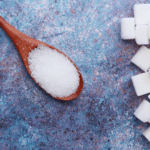
Why is it so difficult to determine how nutrition impacts dementia risk?
When it comes to nutrition research, neither observational nor interventional studies have been able to tell the full story. A report by the Nutrition for Dementia Prevention Working Group offers ideas for improving both.

Sugar substitutes: deep dive into the pros, cons, available options, and impact on metabolic health
Sugar substitutes offer sweet taste with minimal calories, yet they remain controversial. How well do they solve the problems associated with traditional sugar, and where do they fall short?

How does aging increase risk of dehydration?
Aging weakens the regulatory systems for maintaining water balance, necessitating more conscious oversight of fluid intake to prevent dehydration.

The cases for and against dietary protein for healthy aging
An endeavor to settle the debate of high- vs. low-protein diets for increasing lifespan and healthspan

Does carbohydrate load impact the balance between fat storage and oxidation?
A study investigated the effects of different dietary levels of carbohydrates on mitochondrial respiration, but mechanistic conclusions are premature.

Don’t drink and science: why a study on the cognitive effects of wine and cheese is sheer stupidity
A study claiming that daily consumption of cheese and wine may improve long-term cognition seems more like a bad joke than reliable science.

Is a recent clinical trial enough to support the use of semaglutide in treating adolescent obesity?
The imperative for effective weight management strategies in children and teens is clear, but in our desperation for effective obesity treatments, are we allowing ourselves to be too shortsighted on testing?

More hype than substance: erythritol and cardiovascular risk
A newly-published study caught public attention by reporting an association between the common sweetener erythritol and increased risk of heart attack and stroke, but there’s more to the story.



